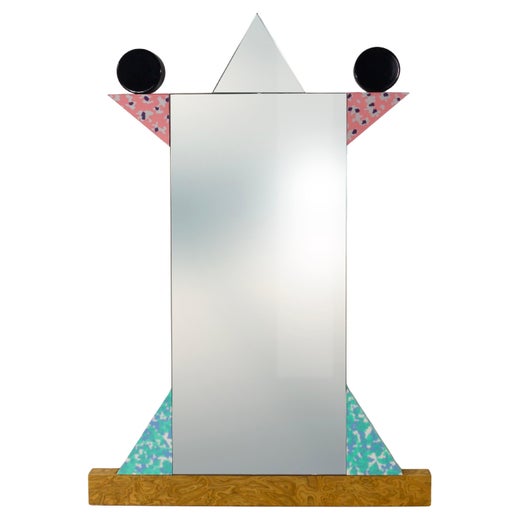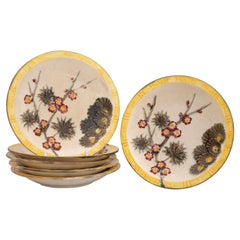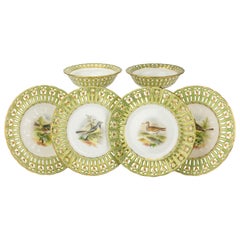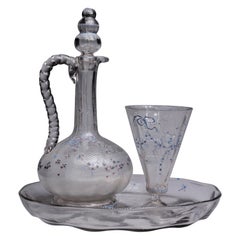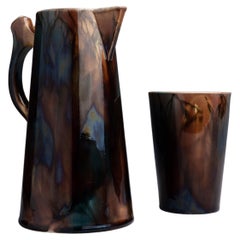Matteo Thun Memphis Milano Hors d'oeuvre Set
About the Item
- Creator:
- Dimensions:Height: 1 in (2.54 cm)Width: 16.88 in (42.88 cm)Depth: 10.75 in (27.31 cm)
- Style:Post-Modern (In the Style Of)
- Materials and Techniques:Porcelain,Glazed
- Place of Origin:
- Period:1980-1989
- Date of Manufacture:1982
- Condition:
- Seller Location:Fort Lauderdale, FL
- Reference Number:Seller: 2022.17.1-21stDibs: LU5643233975312
Memphis Milano
To many people, postmodern design is synonymous with the Memphis Group. This Italian collaborative created the most radical and attention-getting designs of the period, upending most of the accepted standards of how furniture should look. Today, the Memphis Milano brand, which is managed by Alberto Bianchi Albrici, still produces designs created by the group between 1981 and 1988.
The Memphis story begins in 1980, when Ettore Sottsass, then a beacon of Italian postmodernism, tapped a coterie of younger designers to develop a collection for the Milan Furniture Fair the next year, determined that all the new furniture they were then seeing was boring. Their mission: Boldly reject the stark minimalism of the 1970s and shatter the rules of form and function. (Sottsass’s Ultrafragola mirror, designed in 1970, embodied many of what would become the collective’s postmodern ideals.)
The group decided to design, produce and market their own collection, one that wouldn’t be restricted by concerns like functionality and so-called good taste. Its debut, at Milan’s 1981 Salone del Mobile, drew thousands of viewers and caused a major stir in design circles.
So as a record of Bob Dylan’s “Stuck Inside of Mobile” played on repeat, they took their name from the song, devised their marketing strategy and plotted the postmodern look that would come to define the decade of excess — primary colors, blown-up proportions, playful nods to Art Deco and Pop art. A high-low mix of materials also helped define Memphis, as evidenced by Javier Mariscal’s pastel serving trays, which feature laminate veneer — a material previously used only in kitchens — as well as Shiro Kuramata’s Nara and Kyoto tables made from colored glass-infused terrazzo.
An image of Sottsass posing with his collaborators in a conversation pit shaped like a boxing ring appeared in magazines all over the world, and Karl Lagerfield furnished his Monte Carlo penthouse entirely in Memphis furniture. Meanwhile, members like Andrea Branzi, Aldo Cibic, Michele de Lucchi, Nathalie du Pasquier, Kuramata, Paola Navone, Peter Shire, George Sowden, Sottsass and his wife, journalist Barbara Radice, went on to enjoy fruitful careers.
Some people think of the Milan-based collective as the design equivalent to Patrick Nagel’s kitschy screenprints, but for others Memphis represents what made the early 1980s so great: freedom of expression, dizzying patterns and off-the-wall colors.
Eventually, the Reagan era gave way to cool 1990s minimalism, and Memphis fell out of fashion. Sottsass left the group in 1985, and by 1987, it had disbanded. Yet decades later, Memphis is back and can be traced to today’s most exciting designers.
“As someone who was born in the 1980s, Memphis at times feels like the grown-up, artsy version of the toys I used to play with,” says Shaun Kasperbauer, cofounder of the Brooklyn studio Souda. “It feels a little nostalgic, but at the same time it seems like an aesthetic that’s perfectly suited to an internet age — loud, colorful and utilizing forms that are graphic and often a little unexpected.”
Find a collection of Memphis Milano seating, tables, decorative objects and other furniture on 1stDibs.
Memphis Group
To many people, postmodern design is synonymous with the Memphis Group. This Italian collaborative created the most radical and attention-getting designs of the period, upending most of the accepted standards of how furniture should look.
The Memphis story begins in 1980, when Ettore Sottsass, then a beacon of Italian postmodernism, tapped a coterie of younger designers to develop a collection for the Milan Furniture Fair the next year, determined that all the new furniture they were then seeing was boring. Their mission: Boldly reject the stark minimalism of the 1970s and shatter the rules of form and function. (Sottsass’s Ultrafragola mirror, designed in 1970, embodied many of what would become the collective’s postmodern ideals.)
The group decided to design, produce and market their own collection, one that wouldn’t be restricted by concerns like functionality and so-called good taste. Its debut, at Milan’s 1981 Salone del Mobile, drew thousands of viewers and caused a major stir in design circles.
So as a record of Bob Dylan’s “Stuck Inside of Mobile” played on repeat, they took their name from the song, devised their marketing strategy and plotted the postmodern look that would come to define the decade of excess — primary colors, blown-up proportions, playful nods to Art Deco and Pop art. A high-low mix of materials also helped define Memphis, as evidenced by Javier Mariscal’s pastel serving trays, which feature laminate veneer — a material previously used only in kitchens — as well as Shiro Kuramata’s Nara and Kyoto tables made from colored glass-infused terrazzo.
An image of Sottsass posing with his collaborators in a conversation pit shaped like a boxing ring appeared in magazines all over the world, and Karl Lagerfield furnished his Monte Carlo penthouse entirely in Memphis furniture. Meanwhile, members like Andrea Branzi, Aldo Cibic, Michele de Lucchi, Nathalie du Pasquier, Kuramata, Paola Navone, Peter Shire, George Sowden, Sottsass and his wife, journalist Barbara Radice, went on to enjoy fruitful careers.
Some people think of the Milan-based collective as the design equivalent to Patrick Nagel’s kitschy screenprints, but for others Memphis represents what made the early 1980s so great: freedom of expression, dizzying patterns and off-the-wall colors.
Eventually, the Reagan era gave way to cool 1990s minimalism, and Memphis fell out of fashion. Sottsass left the group in 1985, and by 1987, it had disbanded. Yet decades later, Memphis is back and can be traced to today’s most exciting designers.
“As someone who was born in the 1980s, Memphis at times feels like the grown-up, artsy version of the toys I used to play with,” says Shaun Kasperbauer, cofounder of the Brooklyn studio Souda. “It feels a little nostalgic, but at the same time it seems like an aesthetic that’s perfectly suited to an internet age — loud, colorful and utilizing forms that are graphic and often a little unexpected.”
Find a collection of vintage Memphis Group seating, tables, decorative objects and other furniture on 1stDibs.
You May Also Like
21st Century and Contemporary Italian Modern Platters and Serveware
Porcelain
21st Century and Contemporary Italian Modern Tea Sets
Porcelain
21st Century and Contemporary Italian Modern Serving Bowls
Porcelain
21st Century and Contemporary Italian Modern Porcelain
Porcelain
21st Century and Contemporary Italian Modern Glass
Porcelain
Vintage 1980s Italian Modern Tea Sets
Porcelain
20th Century French Country Porcelain
Porcelain
Vintage 1960s American Hollywood Regency Platters and Serveware
Gold
21st Century and Contemporary Italian Modern Platters and Serveware
Ceramic
21st Century and Contemporary Italian Modern Platters and Serveware
Ceramic
More From This Seller
View AllAntique Late 19th Century English Japonisme Pottery
Earthenware, Majolica
Antique Mid-19th Century British Victorian Tableware
Porcelain
Antique 1860s French Art Nouveau Glass
Glass, Art Glass
Antique 1870s British Arts and Crafts Pitchers
Earthenware, Majolica, Pottery
Antique Late 19th Century English Arts and Crafts Decorative Art
Paper
Antique Early 19th Century English Regency Dinner Plates
Ironstone
